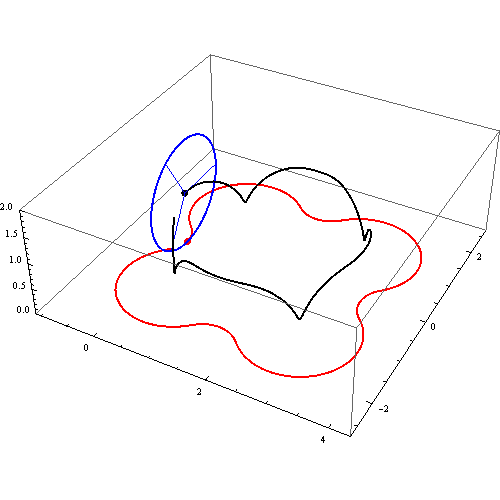| Week |
Monday |
Wednesday |
| Aug 29 |
Overview of Mechanics. Holonomic and nonholonomic constraints. Newtonian
mechanics.  Single-particle problems.
Single-particle problems. |
Newtonian mechanics. Single-particle problems. Viscous drag.
Harmonic oscillator. |
| Sep 05 |
Labor Day - Please, work at home! |
Resonance. Charged particle in a magnetic field. Momentum and
angular momentum. |
| Sep 12 |
Work and energy. Potential forces, criteria of potentiality. Energy
conservation from Newton's law. One- and two-particle interactions. |
Center of mass, reduced mass.
One-dimensional motion, turning points, period of motion
(example: Washboard potential). Phase portraits, separatrix. |
| Sep 19 |
One-dimensional motion: pendulum
Constraints and equations of motion
in special coordinate systems: polar |
Constraints and equations of motion in special coordinate
systems: spherical |
| Sep 26 |
Motion in a central field. Bounded and unbounded motion; open
and closed trajectories. Kepler's law. Precession of orbits as a result of
perturbations. |
Scattering problem, differential scattering cross-section.
 Rutherford formula for scattering on a Coulomb center.
Scattering on a rigid sphere. Small-angle scattering. Rutherford formula for scattering on a Coulomb center.
Scattering on a rigid sphere. Small-angle scattering. |
| Oct 3 |
Yom Kippur
Make-up on
Friday: Problem solving on Newtonian mechanics |
Lagrangian mechanics.  The least-action principle. Lagrange equations. Lagrange function. Examples.
Non-holonomic constraints. Lagrangian of a particle in electromagnetic field.
The least-action principle. Lagrange equations. Lagrange function. Examples.
Non-holonomic constraints. Lagrangian of a particle in electromagnetic field. |
| Oct 10 |
Columbus Day |
No classes
|
| Oct 17 |
Gauge transformation. Galilean transformation. Invariance of Lagrangians and
conservation laws. |
Small oscillations in many dimensions
 |
| Oct 24 |
Problem solving on Lagrangian mechanics & small oscillations. Rotating ring
with a bead
 |
Midterm 1 |
| Oct 31 |
Rotational motion of rigid bodies:

General properties of rotations. Single rotation. Noncommutativity of finite
rotations. Commutativity of infinitesimal rotations, angular velocity. Rolling
constraint. Euler angles. |
Rotational motion of rigid bodies:
Rotation matrices. Active and passive transformations.
|
| Nov 07 |
Rotational motion of rigid bodies:
Rotatonal kinetic energy. Tensor of inertia. Angular momentum and its
equation of motion, torque and rotational potential energy. |
Rotational motion of rigid bodies:
Precession and spin of a symmetric top. Equation of motion for
Euler angles of a free asymmetric top. Stability of rotations.
Larmor equation.
|
| Nov 14 |
Rotational motion of rigid bodies:
Lagrangian formalism. Symmetric top with gravity. |
Rotational motion of rigid bodies:
Equation of motion for
Euler angles of a free asymmetric top. Stability of rotations.
Problem solving: cone. |
| Nov 21 |
Hamiltonian formalism:

Hamiltonian function and equations,
Variational principle; Poisson brackets |
Hamiltonian formalism:
Canonical transformations |
| Nov 28 |
Hamiltonian formalism:
Action as function of coordinates; Hamilton-Jacobi equation |
Hamiltonian formalism:
Hamilton-Jacobi equation; Separation of variables |
| Dec 05 |
Hamiltonian formalism:
Integrable and nonintegrable systems;
Angle-action variables and adiabatic invariant
|
Hamiltonian formalism:
Parametric resonance
  Parametric resonance via natural and angle-action variables Parametric resonance via natural and angle-action variables |
| Dec 13 |
Dynamical Chaos  Motion in a rapidly oscillating field
Motion in a rapidly oscillating field |
Midterm 2 |
